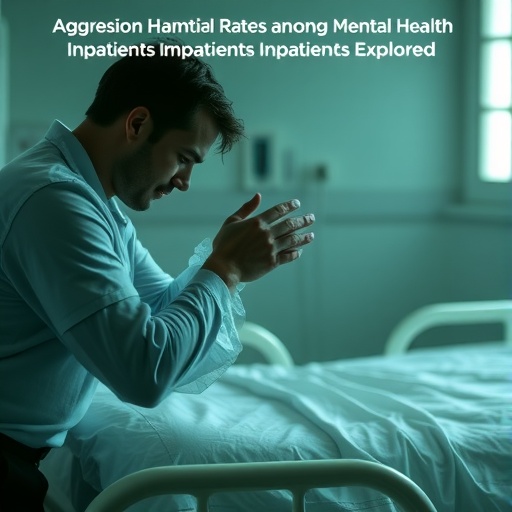Aggression among inpatients with mental illness remains a pressing global concern in psychiatric care, profoundly affecting not only the safety of healthcare professionals but also the overall therapeutic environment. While extensive research has been conducted in high-income countries, there is a marked scarcity of comprehensive data from low-resource settings, particularly in sub-Saharan Africa. A recent pioneering study sheds new light on this critical issue by investigating the prevalence and contributing factors of aggression among psychiatric inpatients in southwestern Uganda’s tertiary hospitals.
The research employed a rigorous cross-sectional methodology encompassing 280 participants admitted across four major tertiary healthcare institutions in the region. Utilizing the Modified Overt Aggression Scale—a validated instrument designed to quantify various aggression types—scientists systematically examined verbal aggression, physical aggression, aggression toward property, and auto-aggression (self-harm). This multifaceted approach enabled a thorough characterization of aggressive behaviors within the inpatient population.
Findings reveal an alarmingly high prevalence of severe aggression, with nearly 43% of patients exhibiting such tendencies during hospitalization. Notably, verbal aggression emerged as the most dominant form, overshadowing both physical attacks and self-directed aggression. This predominance compels mental health practitioners to reconsider management strategies, emphasizing verbal interventions alongside traditional methods.
One of the study’s most significant insights pertains to the association between aggression levels and key psychosocial and clinical factors. Involuntary admission stood out as a powerful predictor of aggression across all severity strata—mild, moderate, and severe. This correlation underscores the delicate balance mental health services must maintain between legal mandates, patient autonomy, and safety. Furthermore, individuals with a documented personal history of aggression displayed heightened risk profiles, suggesting that prior behavioral patterns are critical to forecasting inpatient aggression.
Family history surfaced as another noteworthy factor, particularly in cases of moderate to severe aggression. The genetic and environmental interplay inherent in familial mental health dynamics likely modulates patients’ predisposition to aggressive behavior. This points to potential benefits from integrating family-based therapeutic interventions and genetic counseling into comprehensive care models.
Substance use history was selectively correlated with moderate aggression, highlighting the nuanced role that intoxicants play in behavioral regulation. This finding aligns with global literature linking psychoactive substance consumption with increased impulsivity and violence, reinforcing the necessity for targeted substance abuse screening and management within psychiatric settings.
Similarly, the association between childhood abuse and severe aggression delineates a profound trauma-aggression pathway. Early life adversities may engender maladaptive coping mechanisms, emotional dysregulation, and neurobiological alterations predisposing individuals to violent outbursts. Integrating trauma-informed care frameworks into psychiatric treatment thus becomes imperative in addressing this vulnerable subgroup.
Residence in rural areas also demonstrated a significant association with severe aggression. This geographic variable may reflect disparities in access to continuous mental health services, cultural stigmas, or varying social support structures. Bridging the urban-rural divide in psychiatric care accessibility and education could mitigate this heightened risk.
The implications of these findings resonate deeply with clinicians, hospital administrators, and policymakers. They call for a paradigm shift toward minimizing involuntary admissions where feasible, thereby respecting patient rights and potentially reducing aggression incidence. Strengthened community-based mental health programs, crisis intervention teams, and preventive strategies could collectively dampen the triggers leading to hospitalization and subsequent aggression.
Moreover, routine assessment of aggression risk factors—personal and family history of aggression, substance use, trauma exposure, and socio-demographic contexts—must become integral components of psychiatric evaluation. Such comprehensive profiling can inform individualized care plans, therapeutic engagements, and safety protocols aimed at de-escalating aggressive tendencies.
This study also highlights a universal truth: mental health care is intricately tied to broader societal, cultural, and systemic factors. In contexts like southwestern Uganda, resource limitations, infrastructural challenges, and socio-cultural perceptions of mental illness interplay to influence patient outcomes. Future research must delve deeper into these contextual elements, optimizing culturally sensitive interventions.
In conclusion, aggression among psychiatric inpatients in southwestern Uganda is both prevalent and multifactorial. The study’s revelations on the prevalence rates and associated variables challenge the mental health community to innovate care delivery models that prioritize patient dignity while safeguarding therapeutic environments. As mental health services strive towards equity and effectiveness globally, insights from such underrepresented regions are invaluable.
The road ahead demands collaborative efforts integrating clinical expertise, community engagement, and policy reforms. By addressing identified risk factors through evidence-based interventions, mental health systems can curtail inpatient aggression, enhancing recovery trajectories and ensuring a safer milieu for all stakeholders.
Subject of Research: Aggression among inpatients with mental illness and associated factors at tertiary hospitals in Southwestern Uganda
Article Title: Prevalence of aggression and associated factors among inpatients with mental illness at tertiary hospitals in Southwestern Uganda
Article References:
Kayongo, B., Rukundo, G.Z., Favina, A. et al. Prevalence of aggression and associated factors among inpatients with mental illness at tertiary hospitals in Southwestern Uganda. BMC Psychiatry 25, 417 (2025). https://doi.org/10.1186/s12888-025-06865-6
Image Credits: AI Generated




